
“Sorry, You Said You Were Allergic”: Server Gets Applauded Online For Exposing Gluten-Free Trend Chaser
Eating just a tiny amount of food that a person is allergic to can trigger their body, causing digestive problems, hives, or swollen airways. In some people, it can lead to severe symptoms or even a life-threatening situation.
While those who suffer from one would gladly give away their allergy, there are others who apparently crave one.
A few days ago, one Reddit user submitted a story to the platform’s ‘Malicious Compliance‘ community about an annoying customer they had while working at a restaurant who would regularly fake a gluten allergy.
Eventually, the server got so sick and tired of this woman that they called out her attention-seeking behavior.
This server got sick and tired of a regular customer faking a gluten allergy
Image credits: Andrea Piacquadio (not the actual photo)
So they called the woman out while playing by her rules
Image credits: Alexander Dummer (not the actual photo)
We managed to get in touch with the author of the post and they agreed to have a little chat with us. “I’ve worked at the restaurant for around 12 years,” they told Bored Panda. “The clientele is eclectic, all walks of life. As in most customer service industries, you have awesome customers, bad ones, needy ones, easygoing ones.”
“This customer just caught me on a bad day and had been fairly rude in the past so I was more or less just sticking it to them.”
“We work very hard to accommodate all of our customers and their needs. We maintain a professional environment centered around good service and experiences,” the Redditor said about their team. “Once in a while, a difficult customer decides to be extra difficult and sometimes you just have to recognize no matter what you do, it will not please them. In those cases, it’s best to recognize it’s better for you and them if they find somewhere else to eat as neither of you will be happy.”
Obviously, servers have to adjust to the clients. But that doesn’t give them the right to act like jerks. “Customers can make experiences in dining easier by knowing their own dietary restrictions and making it clear in a polite manner to the staff,” the author of the post highlighted. “It helps even more if they research the menu ahead of time to get a better idea of what the restaurant has to offer.”
“Most people with allergies are self-educated enough that they can look at a menu and already know mostly what they can have and cannot have. It’s up to the servers to clarify further based on the educated questions of the patron. The more polite and patient you are with the staff, the more they will go out of their way for you (in most cases).”
“We are there to create a good experience, no dietary restrictions barred, and if the person ordering the food comes in with the mindset to treat the staff poorly in the first place, nothing you can do as a server or cook can help,” they added. “Good service and experiences are the goal and for some reason, people find it surprising to hear it’s a two-way street.”
Another thing that frustrates the staff is trying to completely change the dish you’re ordering. There’s a difference between omitting and/or adding something and transforming the darn thing. “Someone spent time thinking through the flavors and pairings to make a dish, kind of like an art piece,” the server said. “[Imagine] if you were to walk up to a famous painting and say, ‘Yeah, but I think it needs more red here, more green there, less blue, and change the overall angle.’ They fail to capture what that piece was supposed to be. Same for food. When you ask to change all the ingredients in a dish, you are not even attempting to taste what the chef wanted you to capture in the first place. And a lot of times, those people don’t end up liking the dish they made all the changes to.”
But coming back to people with fake limitations, the server just wants them to stop. “You’re ruining the climate for those that actually have allergies. There are too many of you. You’re not special, trust me.”
“As for the ones that do have true limitations and allergies, I’m so sorry you’re going through it. Please let us know right away so we can go through the proper procedures for handling your food with the utmost care and caution to make your experience as enjoyable as we can. Be patient and polite with us. It’s often not easy,” they added. “We need to quickly procure an entire different set of tools, cookware, and even have to get creative on the spot to make sure your food is safely made; often in the middle of a very busy rush. A restaurant attempts to be a well-oiled machine and it creates a speed-up, one we are happy to accommodate, but still not easy on us.”
Food allergy affects about 8% of children under age 5 and up to 4% of adults. While there’s no cure, some change as they get older.
The most common food allergy signs and symptoms include:
- Tingling or itching in the mouth;
- Hives, itching or eczema;
- Swelling of the lips, face, tongue and throat or other parts of the body;
- Wheezing, nasal congestion or trouble breathing;
- Abdominal pain, diarrhea, nausea or vomiting;
- Dizziness, lightheadedness or fainting.
So, somehow I doubt that the lady would say “Oh, that’s fine” if she actually ticked this list.
Not to mention that in some people, a food allergy can trigger a severe allergic reaction called anaphylaxis, which causes symptoms including:
- Constriction and tightening of the airways;
- A swollen throat or the sensation of a lump in your throat that makes it difficult to breathe;
- Shock with a severe drop in blood pressure;
- Rapid pulse;
- Dizziness, lightheadedness or loss of consciousness;
- Emergency treatment is critical for anaphylaxis. Untreated, anaphylaxis can cause a coma or even death.
Food allergy is spreading on a global level, with the greatest rise happening in the US and other industrialized countries.
In fact, the number of people suffering from it in America has doubled each of the last decades. New data suggest that at least 10.8% (>26 million) of US adults are food allergic, whereas nearly 19% believe that they have a food allergy.
About 6 million American children, or roughly 2 kids in every classroom, have an identified food allergy.
Anyone can develop this pesky thing.
In fact, there are findings indicating that the majority (2/3) of children who develop a food allergy do not have a parent with one. (With the rapid rise of food allergies over the past generation, experts believe that increases in allergy susceptibility are being driven, in part, by environmental factors.)
But as we can see, anyone can fake having one, too. How sad do you have to be if this is how you get strangers to notice you?
Both people with and without food allergies loved the way this server handled the situation
My sister did this once. She told her boyfriend she was allergic to peanuts, even though shes totally fine with them. He avoided eating anything with peanuts around her until the truth eventually came out when she was visiting our house. She just isn't the biggest fan of peanuts. It's gross and disrespectful when people fake an allergy.
It's pretty childish too to fake an allergy instead of just being honest and saying "no I don't like it so I don't want it".
Load More Replies...I ended up learning to say I was *intolerant* to shellfish instead of allergic, because of one person who insisted it was only an allergy if my airways closed up. I get dizzy, faint and my body rejects the meal from both ends, and I get a rash across my stomach. But because my airway remains open the entire time, I'm not allergic /s! (D******d). I'm actually fine with cross contamination, it's only triggered by ingesting the substance in question, so I suppose restaurants can be a bit more lenient with me. But it still makes me incredibly ill, and the reaction gets worse each time (took a while to work out what it was that caused it), so, yeah, I'm not looking forward to it escalating to full anaphylaxis just to prove one idiot wrong.
I was about to say the same thing. An intolerance generally leads to an upset digestive system, whereas an allergy leads to an allergic reaction, which can be fatal. Someone who is intolerant to something can normally handle cross-contamination, but not if it is an ingredient. Someone who is severely allergic can die from even a tiny bit of cross-contamination. I am lactose intolerant, and if stuck for something in a restaurant will go for the thing that contains the least milk products. There doesn't need to be a fuss. I don't need you to prepare it in a clean room. For some things I may need to ask what they are made with - cakes may or may not be made with butter etc.
Load More Replies...A couple years ago, I have been working in a kitchen in a physical rehabilitation center/hotel (a hotel your insurance sends you to to get your PT, for a few weeks). We mostly had older people who fell and needed to get their mobility back, but also some people after accidents and some who had some serious illnesses and needed some extra care and to gain back their strength after being in the hospital for a long time. Being in a somewhat medical environment we had very strict standards for food and for dealing with allergies/intolerances. Menu plans worked out by a doctor for everyone with dietary restrictions. One some days we had to cook for our 300 regular eaters and then up to 40 special meals. It so annoying when you see some of those people at the buffet on Sunday, taking all the food they are supposed to be allergic to. If you don't like something fine just let us know, I'm sure we can figure something out you like, but don't claim that you are allergic to it!
My sister did this once. She told her boyfriend she was allergic to peanuts, even though shes totally fine with them. He avoided eating anything with peanuts around her until the truth eventually came out when she was visiting our house. She just isn't the biggest fan of peanuts. It's gross and disrespectful when people fake an allergy.
It's pretty childish too to fake an allergy instead of just being honest and saying "no I don't like it so I don't want it".
Load More Replies...I ended up learning to say I was *intolerant* to shellfish instead of allergic, because of one person who insisted it was only an allergy if my airways closed up. I get dizzy, faint and my body rejects the meal from both ends, and I get a rash across my stomach. But because my airway remains open the entire time, I'm not allergic /s! (D******d). I'm actually fine with cross contamination, it's only triggered by ingesting the substance in question, so I suppose restaurants can be a bit more lenient with me. But it still makes me incredibly ill, and the reaction gets worse each time (took a while to work out what it was that caused it), so, yeah, I'm not looking forward to it escalating to full anaphylaxis just to prove one idiot wrong.
I was about to say the same thing. An intolerance generally leads to an upset digestive system, whereas an allergy leads to an allergic reaction, which can be fatal. Someone who is intolerant to something can normally handle cross-contamination, but not if it is an ingredient. Someone who is severely allergic can die from even a tiny bit of cross-contamination. I am lactose intolerant, and if stuck for something in a restaurant will go for the thing that contains the least milk products. There doesn't need to be a fuss. I don't need you to prepare it in a clean room. For some things I may need to ask what they are made with - cakes may or may not be made with butter etc.
Load More Replies...A couple years ago, I have been working in a kitchen in a physical rehabilitation center/hotel (a hotel your insurance sends you to to get your PT, for a few weeks). We mostly had older people who fell and needed to get their mobility back, but also some people after accidents and some who had some serious illnesses and needed some extra care and to gain back their strength after being in the hospital for a long time. Being in a somewhat medical environment we had very strict standards for food and for dealing with allergies/intolerances. Menu plans worked out by a doctor for everyone with dietary restrictions. One some days we had to cook for our 300 regular eaters and then up to 40 special meals. It so annoying when you see some of those people at the buffet on Sunday, taking all the food they are supposed to be allergic to. If you don't like something fine just let us know, I'm sure we can figure something out you like, but don't claim that you are allergic to it!

 Dark Mode
Dark Mode 

 No fees, cancel anytime
No fees, cancel anytime 




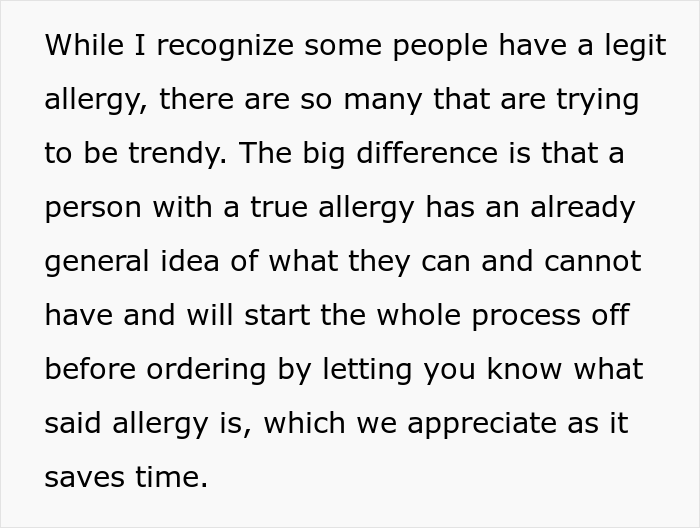
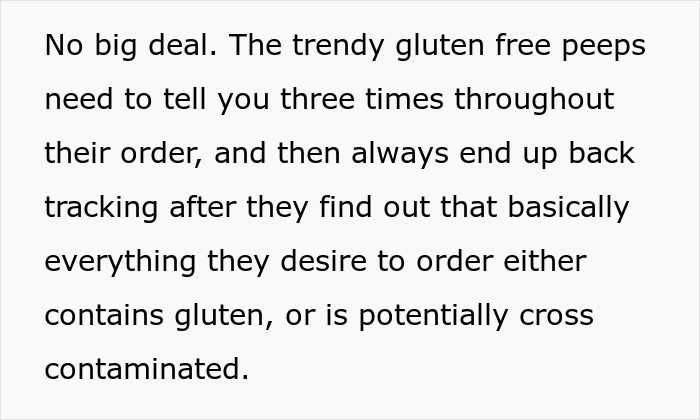





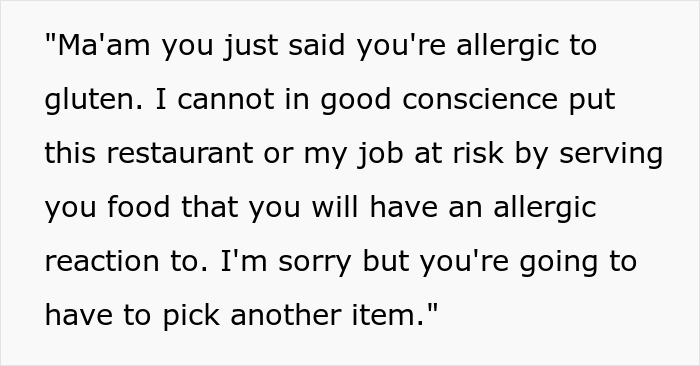
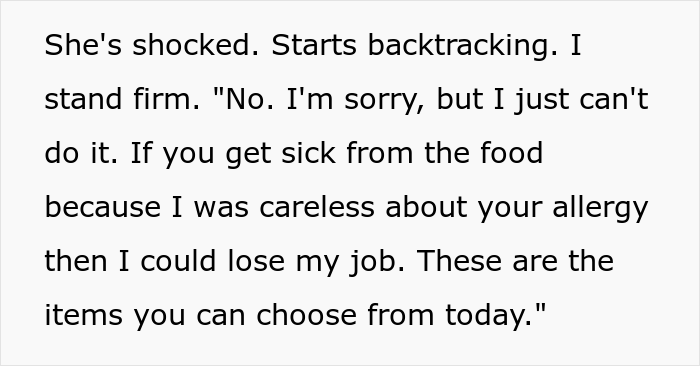












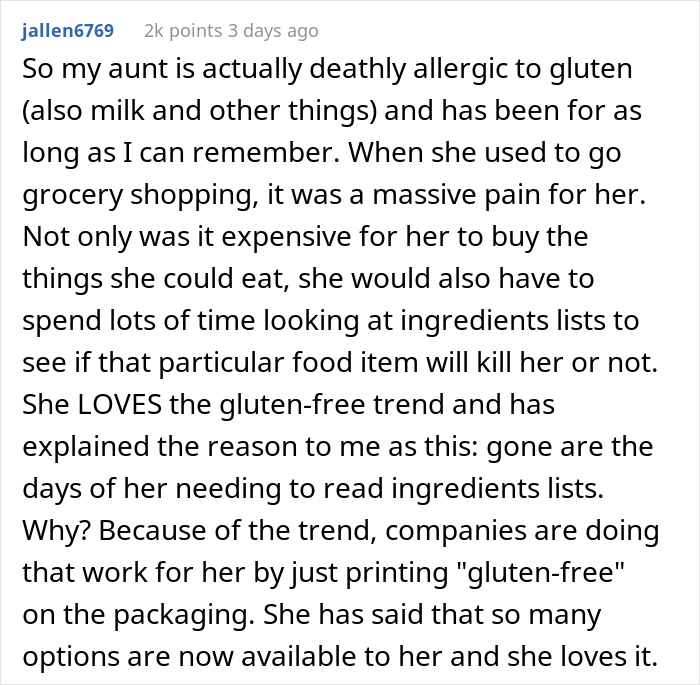
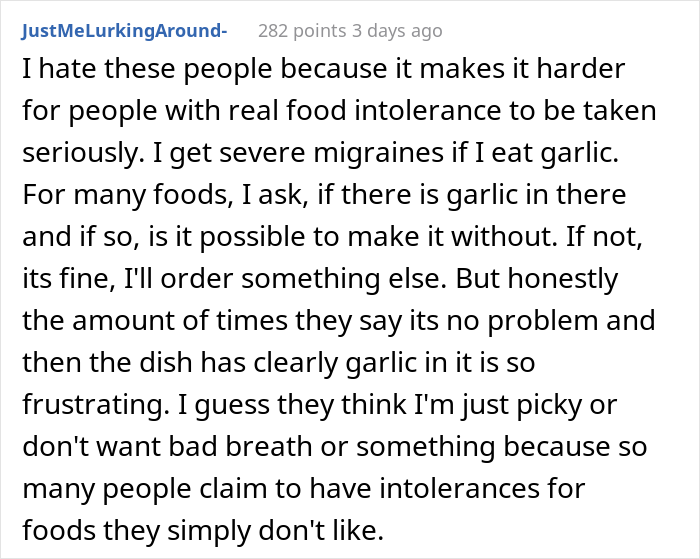
























113
55